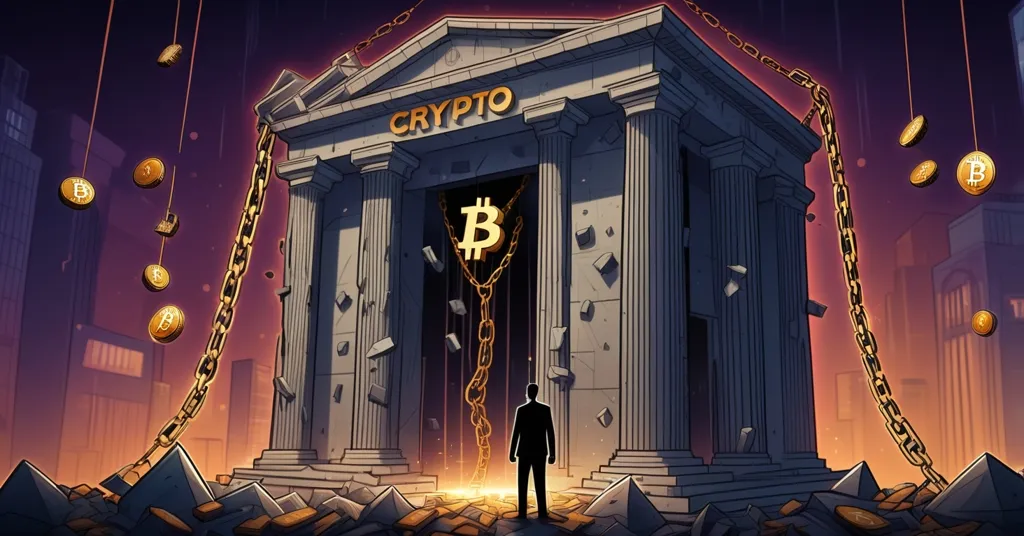SEC Drops Binance Lawsuit: Major Crypto Win or Temporary Reprieve?

SEC Drops Lawsuit Against Binance: A Crypto Victory or Just a Breather?
The U.S. Securities and Exchange Commission (SEC) has officially backed off its legal assault on Binance, the heavyweight champion of cryptocurrency exchanges. This dismissal, finalized on May 29, 2025, in a Washington, D.C. federal court, is being hailed as a massive win for the crypto industry, which has spent years dodging regulatory haymakers. Yet, amidst the cheers, there’s a nagging question: is this a genuine turning point for digital assets, or just a momentary lapse in the ongoing slugfest between innovation and oversight?
- Legal Win: SEC dismisses lawsuit against Binance, originally filed in June 2023, for alleged securities law breaches.
- Market Yawn: Binance Coin (BNB) barely budges with a 0.4% uptick, hinting the news was already expected.
- Bigger Picture: Similar case drops for Coinbase and Kraken suggest a possible regulatory rethink.
Background: Binance Under Fire
Let’s rewind to June 2023, when the SEC came out swinging, accusing Binance and its former CEO, Changpeng Zhao (known as CZ in the crypto world), of violating U.S. securities laws. The charges weren’t light: artificially pumping trading volumes, mishandling customer funds, and operating as an unregistered securities exchange. For those new to the space, the SEC often tags certain crypto tokens as “unregistered securities” if they resemble investment contracts—think of them as stocks or bonds without the paperwork—unlike Bitcoin, which is widely seen as a decentralized commodity and largely outside their grip. This lawsuit was a poster child for the tension between blockchain’s borderless ethos and traditional financial rulebooks.
Binance wasn’t just a random target; it’s the biggest exchange globally by trading volume, making it a lightning rod for regulators itching to rein in the Wild West of crypto. The legal battle dragged on until early 2025, with proceedings paused in February, before culminating in the recent joint stipulation for dismissal “with prejudice”—a legal term meaning the SEC can’t refile these exact claims. In layman’s terms, this is as close to a knockout victory as Binance could hope for in this round. For more details on the exchange’s history, check out its background on Wikipedia.
Binance.US Cheers, But Market Shrugs
Binance.US, the exchange’s American arm, didn’t mince words in celebrating the outcome. Their statement on social media platform X practically radiated relief and ambition:
“This is a major milestone for our company. With this case behind us, we’re turning our full attention to growth—expanding crypto access, winning back trust, and restoring relationships that were impacted by the SEC.”
As a staunch advocate for decentralization and the disruptive power of blockchain, I can’t help but feel a spark of optimism here. Bitcoin and its ilk are tools for financial freedom, privacy, and upending a rotten status quo—seeing a giant like Binance get a reprieve feels like a small win for the cause. But let’s not get carried away. The market’s response was the crypto equivalent of a polite golf clap. Binance Coin (BNB), the exchange’s native token used for transaction fees and often a barometer of investor sentiment, crept up a pitiful 0.4% after the news. If you’re new, that’s basically a shrug—traders had already bet on this outcome long before the ink dried on the dismissal. Some expert opinions on Reddit dive into why BNB’s price reaction was so muted despite the big news.
Regulatory Winds: A Shift or a Mirage?
What’s really got tongues wagging is the wider context. This isn’t an isolated event—the SEC has also recently shelved cases against other big players like Coinbase (in February 2025) and Kraken. Under the iron fist of former SEC Chair Gary Gensler, crypto was treated like a lawless frontier, with tokens slapped as unregistered securities and lawsuits flying like confetti. But the tide seems to be turning, especially since Paul Atkins took the SEC helm on May 12, 2025, under the Trump administration. Atkins, a known pro-crypto voice, has made it his mission to craft clear rules for digital assets rather than bludgeoning the industry with enforcement. Hell, he’s even scrapped restrictive policies like Staff Accounting Bulletin 121 (SAB 121). For the uninitiated, think of SAB 121 as a rule that forced banks to treat crypto like radioactive waste on their balance sheets, scaring Wall Street off from dipping a toe in. Its removal is a big deal, and you can read more about Atkins’ stance in his recent remarks on crypto policy.
Then there’s the political flavor. Donald Trump, dubbing himself the “crypto president,” has pushed for deregulation, with his administration shutting down the Justice Department’s crypto enforcement team. Add in his family’s ties to ventures like the $TRUMP token (boasting a $2.4 billion market cap) and World Liberty Financial (WLF)—where Binance reportedly holds a $2 billion stake—and you’ve got a stew of potential conflicts. WLF, for those unfamiliar, is a crypto project linked to Trump associates, aiming to blend DeFi with mainstream finance. Is this dismissal purely a policy pivot, or are personal interests tipping the scales? As Bitcoin maximalists, we have to ask: does cozying up to centralized giants like Binance undermine the very decentralization we fight for? For broader implications, explore what this means for the industry on Quora discussions.
SEC Commissioner Hester Peirce offered a grounded take, telling media that enforcement is now case-by-case, but warned against mistaking this for a free-for-all. Her words cut through the hype: even as we push for effective accelerationism—ramming tech progress full throttle—fraudsters still lurk in the shadows of DeFi and beyond. A softer SEC might open doors for innovation, but who’s watching the back door for scammers?
Binance’s Rap Sheet: Trust Isn’t Built Overnight
Let’s not pretend Binance is some saintly savior of crypto. Their rap sheet reads like a crime novel. In 2023, they coughed up a staggering $4.3 billion to settle anti-money laundering violations, and CZ himself did a four-month prison stint, released in September 2024. This SEC dismissal might clear one hurdle, but rebuilding trust, as Binance.US promises, is a Herculean task. And it’s not just their past—wider market shenanigans like front-running and maximal extractable value (MEV) exploitation taint the space. MEV, for the newcomers, is when savvy players reorder blockchain transactions to profit at others’ expense—imagine someone cutting in line to snag a cheap token before your buy order hits, then flipping it for a quick buck. If the SEC is easing off, who protects retail investors from these wolves? You can find some heated takes on Binance’s legal history over at this Reddit thread.
I’m all for disrupting the financial old guard, but let’s not kid ourselves—centralized exchanges like Binance have often been part of the problem, not the solution. As a Bitcoin purist at heart, I see BTC as the unassailable fortress of sound money, while platforms like Binance and their tokens are messy foot soldiers expanding the battlefield. They fill niches Bitcoin doesn’t touch, sure, but at what cost to the ethos of decentralization? For insights into the latest regulatory shifts affecting exchanges, see this update on SEC policy changes.
Global Plays: Binance Looks Beyond the U.S.
While the U.S. regulatory drama unfolds, Binance isn’t twiddling its thumbs. They’re making moves globally, forging ties with entities like Pakistan’s Crypto Council (with CZ as an adviser) and investing in state-backed projects such as MGX’s USD1 stablecoin. It’s a cunning strategy—hedging bets in friendlier territories while the U.S. figures out its stance. This global pivot raises a point for us decentralization champions: while Bitcoin remains borderless by design, altcoin ecosystems and exchanges often play ball with governments and centralized powers. Is this the pragmatic path to mass adoption, or a slow betrayal of crypto’s roots? Learn more about Binance’s perspective on regulatory impacts in this analysis of 2025 regulations.
What’s Next for Crypto: Clarity or Chaos?
The million-dollar question is whether this dismissal marks a lasting truce between regulators and crypto, or just a tactical retreat. Atkins’ focus on roundtables and collaborative rulemaking suggests a brighter horizon, but without finalized guidelines, uncertainty looms like a dark cloud. If the SEC flips back to hardline enforcement, we’re back to square one. On the flip side, clear pro-crypto laws could turbocharge adoption, bolster privacy, and cement blockchain as the future of finance. For now, the industry breathes easier, with reduced legal risks potentially spurring innovation. But freedom isn’t free, and the fight for a truly decentralized world is a marathon, not a sprint. Dive into the specifics of the court dismissal with this report on the SEC’s decision.
Let’s also ponder the dark side of a hands-off SEC. A lighter touch might embolden the rug-pull artists and fake ICO peddlers who’ve burned countless investors. Binance and others must prove they’re not part of that swamp—trust isn’t a PR campaign; it’s consistent, transparent action. And for us Bitcoin diehards, any regulatory thaw that overly legitimizes centralized players risks diluting what makes BTC the king: uncompromised sovereignty. For an industry-wide take on this win, read this overview of the SEC’s lawsuit dismissal.
So, while we savor this win, let’s keep our guard up. The crypto revolution is far from won, and every step forward comes with a shadow. Will this be the spark that lights the path to mainstream acceptance, or just a flicker before the next storm?
Key Questions and Takeaways
- Why did the SEC drop its lawsuit against Binance in 2025?
The specifics aren’t public, but the timing under new SEC Chair Paul Atkins, combined with a joint dismissal filing, points to legal challenges and a broader pro-crypto policy shift. - What does the Binance SEC case dismissal mean for cryptocurrency regulation?
It eases immediate legal threats for major exchanges like Binance, Coinbase, and Kraken, hinting at a softer U.S. approach, though unclear rules still pose long-term risks. - Why didn’t Binance Coin (BNB) spike after the announcement?
BNB’s measly 0.4% bump shows the market likely saw this coming, with investors already factoring in the resolution before the official news broke. - Does Paul Atkins’ SEC leadership signal lasting change for Bitcoin and altcoins?
His pro-innovation moves, like axing SAB 121, suggest a friendlier crypto climate, but without concrete regulations, this could be a temporary breather rather than a permanent pivot. - Can Binance rebuild trust after past scandals like the $4.3 billion fine?
Their commitment to growth and transparency is a start, but a history of anti-money laundering failures and market manipulation risks means they’ve got to walk the talk—skepticism is justified.



